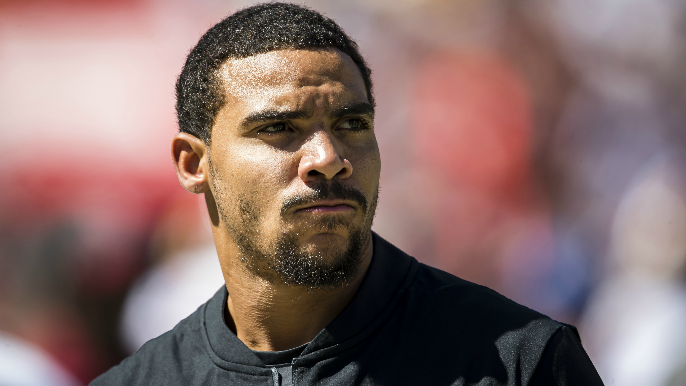Photo by Scott Taetsch/Getty Images
Seven (documented) concussions later, Jordan Reed’s football career continues. There were many who wondered if his last one, prior to the 2019 season, which sidelined him for all of last season, would be a career-ender. The science of concussions is nebulous and ever-evolving, but what is clear is that each concussion makes another more likely, and each concussions does damage to the brain.
But there’s no formula. There’s no equation Reed could plug in to say, “Okay, I’ve had seven concussions in nine years, I’m 30 years old, these will be my symptoms at age 50.” Concussions can cause CTE (chronic traumatic encephelopathy), which is a degenerative brain condition which can currently only be diagnosed upon death. They can cause mood swings, sensitivity to light, memory problems, early onset dementia and numerous other mental issues.
But no one call tell a player which of these issues they’ll be dealt or when it will happen. Maybe Reed has already crossed the threshold. It’s impossible to know. Only he could decide whether it was worth these incalculable risks to continue to his once promising NFL career. Per OverTheCap, he’s already made north of $32 million and his $1.05 million deal with the 49ers is incentive-laden. That’s still a substantial sum of money, but not worth risking your life over. Clearly, it’s not about the money at this point.
Reed said Sunday he did consider retirement, and intimated that playing with the Washington Football Team wasn’t exactly the most hope-inspiring of situations.
“I definitely thought about hanging up on after last season,” Reed said. “But it was when I saw the Super Bowl that really ignited me again. I want to play in those big games. God blessed me to be here and a part of this great team, gave me an opportunity to be in that situation. That’s what’s driving me and I just love the game of football. I’ve still got the drive to keep playing.”
In signing with the 49ers, Reed reunited with Kyle Shanahan, his offensive coordinator in his rookie year in Washington, who described Reed to George Kittle as the best route-running tight end he’s ever coached (that’s been evidenced thus far through camp.
Reed’s assessment of camp so far was backyard football-like in how its rekindled his joy in the sport.
“This is the most fun I’ve had playing football, ever,” Reed said. “Honestly. I don’t know if it’s because I didn’t play all season last year or what, but since I’ve been out there I’ve just been having a blast and I’ve just been really grateful.”
He said he consulted medical professionals before deciding to continue to play this offseason and that he passed tests, but declined to reveal what those tests were for.
There are challenges Reed’s faced since being re-integrated into camp with pads on. Learning (or re-learning, though it’s evolved) the Kyle Shanahan playbook is something he said is challenging and works best when he’s given reps. As of late, Shanahan has obliged, providing him with increased reps, with Kittle and Ross Dwelley out. And he’s impressed, demonstrating that shiftiness and his aggressive hands that earned him a Pro Bowl nod.
After a career on the brink, though, Reed might have more working for him than against him. He has a former coach who loves his game, a medical/training staff he commended for their professionalism, and a building with a positive energy he may have never been a part of in his career.
“It’s been great so far,” Reed said. “Coming from Washington to coming here, it’s a big change for me. Big culture change. Everything’s upbeat, positive. Everybody’s doing their jobs to the best of your ability and it just brings out the best in you because you want to you want to fit the standard here, so I’m grateful for being here.”







